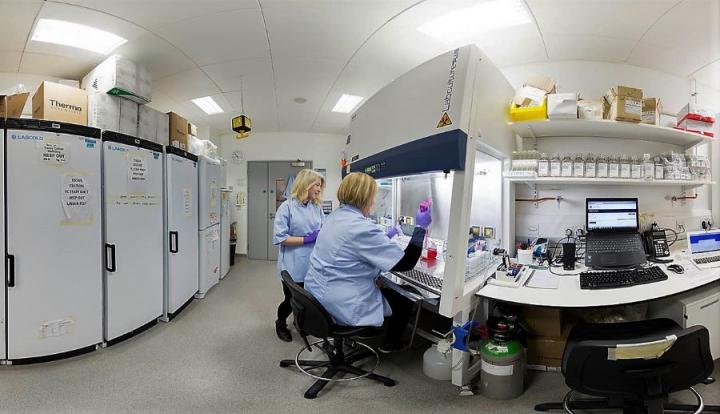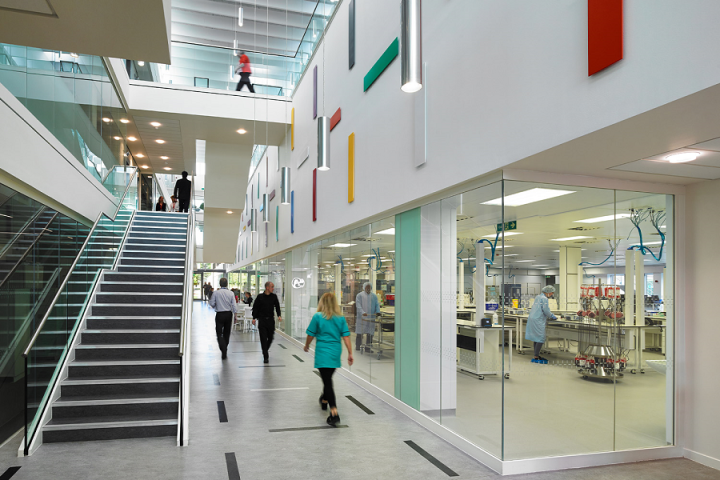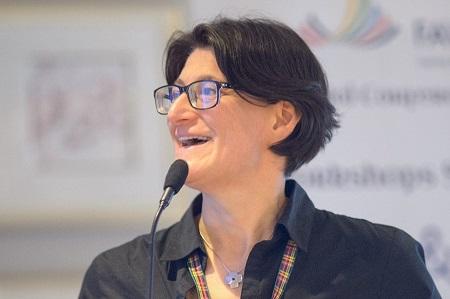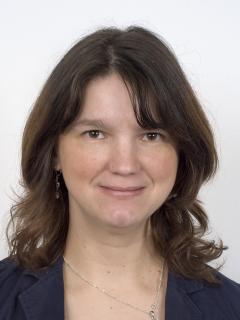People and research centres
Find out who will deliver the programme and where you can do your research projects.
Study at the Institute for Regeneration and Repair, part of Edinburgh Medical School
You will study in laboratories at the Institute for Regeneration and Repair (IRR), based at a vibrant biomedical research campus. The Institute incorporates the Centre for Regenerative Medicine (CRM), the Centre for Inflammation Research (CIR) and the MRC Centre for Reproductive Health (CRH). IRR brings together world-leading fundamental stem cell, inflammation, reproductive health and regenerative medicine research with established clinical excellence to deliver a "bench-to-bedside" approach to address the challenges posed by major diseases.
IRR houses state-of-the-art laboratory space and various centralised facilities that are operated by expert facility managers, including tissue culture, flow cytometry, specialist microscopy, imaging, high content screening and histology facilities and a transgenics service.
Institute for Regeneration and Repair (IRR) website
The MSc by Research in Regenerative Medicine and Tissue Repair programme is hosted at the Centre for Regenerative Medicine (CRM), a world-renowned biomedical research centre. Seminars, lectures, tutorials and discussion groups will be held primarily at CRM, but may occasionally be hosted at other University centres and collaborating organisations.
Centre for Regenerative Medicine (CRM)
Research at CRM is aimed at gaining a fundamental understanding of stem cells and regeneration and to use this to develop new models, diagnostics and therapies to improve human health.
You can take a look inside our centre via a virtual tour of our excellent facilities, guided by former PhD student Sophie Quick.
Explore CRM via a virtual tour
CRM is home to 24 highly interactive research groups working to understand stem cells and their interactions with the tissues within which they reside.

Research themes at CRM include stem cell development and formation of the niche, tissue maintenance and repair, degeneration and regeneration, reprogramming of somatic cells to induced pluripotent stem cells (iPS cells) and disease modelling using stem cells.
Research programmes at CRM currently span four therapeutic targets (brain, blood, liver and heart), with others being developed by strategic recruitments.
Key to the philosophy of the centre is that collaborations with other University Centres and the use of Edinburgh’s superb clinical research infrastructure enable the application of regenerative biology and medicine to a wide range of biological problems and diseases. Students on our programme are encouraged to learn from and contribute to the Centre’s drive to translate their scientific outputs into clinically relevant applications.
Centre for Inflammation Research (CIR)
Researchers at CIR study the prevention, diagnosis and treatment of inflammatory diseases.
Research groups at CIR focus on the following four key thematic areas:
- Immune modulation and regulation of inflammation
- Tissue remodelling and regeneration
- Imaging inflammation
- Pathway medicine

Clinical delivery: Scottish National Blood Transfusion Service and Cell & Gene Therapy Catapult
The CRM building houses a clinical translation unit, enabling the production and culturing of cells at GMP-grade (Good Manufacturing Practice) that are suitable for therapeutic applications.
This unit is run by the Scottish National Blood Transfusion Service (SNBTS), with whom the centre collaborates closely on developing cell therapies, including a Phase 2 autologous macrophage cell therapy trial for Liver Cirrhosis, led by Professor Forbes.
Experts who work across the life cycle of cell and gene therapy development and production at the Scottish National Blood Transfusion Service, Cell & Gene Therapy Catapult Edinburgh, Resolution Therapeutics and Macomics deliver training in the development and manufacturing of Advanced Therapy Medicinal Products, and typically offer rotation projects for the programme's Clinical Delivery pathway. The programme organises visits for the cohort to several life sciences companies in the Edinburgh area so students can find out what working in biotech industry is like and start building a network of contacts.

Scottish National Blood Transfusion Service
Cell & Gene Therapy Catapult Edinburgh
Programme management team
The programme Director is Dr Marieke Hoeve, Head of Postgraduate Programmes at IRR and Senior Lecturer, and the programme’s Deputy Director is Dr Mihaela Crisan, Group Leader at CRM. The programme is supported by the CRM Postgraduate Coordinator Ms Kelly Douglas.
Programme Director Dr Marieke Hoeve web page
Programme Deputy Director Dr Mihaela Crisan web page

Research supervisors
The programme involves over 30 senior researchers/lecturers based at IRR who contribute to various postgraduate training programmes at The University of Edinburgh, including the CRM,CIR and CRH PhD training programmes, the Wellcome Trust PhD Programme in Tissue Repair, the Martin Lee Doctoral Scholarship Programme in Stem Cell and Regenerative Medicine, BBSRC EASTBIO, MRC Precision Medicine, and Biomedical MSc programmes.
IRR group leaders and clinical delivery experts at SNBTS and Cell & Gene Therapy Catapult Edinburgh are experienced in delivering a range of postgraduate training components, including lecturing, tutoring and mentoring students, supervising and training them during rotation projects, and dissertation preparation and assessment.
Postgraduate study in Edinburgh
As a postgraduate student at Edinburgh Medical School you'll be at the heart of our dynamic and collaborative community. You will work in partnership with our passionate staff, who are dedicated to nurturing the unique talents of each student in helping tackle the biggest challenges facing our world today.
Explore what it's like to live and study in Edinburgh
The University of Edinburgh and College of Medicine and Veterinary Medicine
The University of Edinburgh is one of the world’s leading research universities. and we are consistently ranked one of the top 50 universities in the world. The QS World University Rankings 2023 have placed the University 15th in the world, while we ranked 29th in the Times Higher Education World University Rankings 2023, and 4th in the UK for research power, with 90% of our research activity classified as world leading or internationally excellent in the 2021 Research Excellence Framework (REF). Medical research at the University of Edinburgh has world-wide impact and has benefitted millions of people in a range of biomedical areas.
The Institute for Regeneration and Repair has a proven track record in translational research. IRR is based at Edinburgh BioQuarter, which incorporates a major teaching hospital, University of Edinburgh Biomedical Research centres and business incubator premises.
CRM, CIR and CRH are three of five interdisciplinary research centres that form the Deanery of Clinical Sciences (Dean: Professor Hilary Critchley). The Deanery has an international reputation in clinical-based research through the combination of fundamental, clinical and translational science and epidemiological studies, and as a part of the College of Medicine and Veterinary Medicine, offers unparalleled opportunities for ground-breaking interdisciplinary research in the biomedical sciences.
The College of Medicine and Veterinary Medicine traces its origins back nearly 500 years (Darwin, Simpson and Conan-Doyle are alumni) and is internationally renowned for its research and teaching. Professor Moira Whyte is the Head of College, the only conjoint Medical and Veterinary Medical School in the UK. The College employs over 3000 academic and support staff.
For more than four centuries, students and staff at The University of Edinburgh have rewritten history time and again through their achievements. They have explored space, revolutionised surgery, published era-defining books, paved the way for life-saving medical breakthroughs and introduced to the world many inventions, discoveries and ideas from penicillin to Dolly the sheep. We believed that anything is possible, we still do.
Edinburgh is a vibrant and historic capital city - regularly voted as one of the most desirable places to live in the world - with world-famous cultural festivals and the mountains and beaches of Scotland on your doorstep.
Student life at The University of Edinburgh
Postgraduate Study at the College of Medicine and Veterinary Medicine
Postgraduate Study Open Days, events and visits

